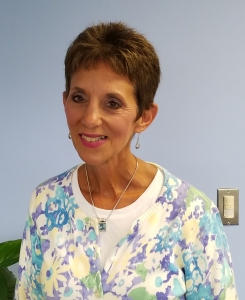
By Jean Carosella, LCSW
In April 2021, I retired from dialysis social work after working in the same clinic for almost 44 years. I had actually planned to retire a year earlier but the pandemic played a major role in my staying on another year. I just couldn’t leave knowing the stress and worry that COVID was creating for everyone in the clinic, patients and staff alike. But now a year into retirement, I can see one positive outcome for me as a result of the pandemic. COVID forced me to slow down and take the time to reflect on what my role as a dialysis social worker has meant to me.
I started my job in dialysis one week after graduating with my master’s degree in social work. I may have held the piece of paper saying I had all the education in the world, but I had very little life or professional experience. I knew dialysis had “something to do with kidneys” but it surely was not a topic covered in any of my social work classes. The first year was rough. I struggled, trying to figure out my role and how I could be helpful to patients and their families. I thought I was supposed to talk to them at every single visit about the meaning of their illness and how it affected their lives. But I eventually realized as they politely listened to me while stealing glances back at their TV screens, that there was so much more to my role. And the most important part was getting to know them as people with lives outside of those dialysis chairs. Only after I worked to make that personal connection could I earn their trust. It was then that our work together could begin. I had to get over my own worries about whether or not I could do the job and I had to be willing and open to hear each person’s story. By putting myself in the position of listener and learner, I was invited into their lives. What a gift for me! 
Over the years I worked with patients on issues that were important to them – things you would expect and others “outside the box.” We talked about some of the usual topics such as transplant and the importance of staying in touch with the transplant team; fistulas, grafts, and catheters and their doctors’ recommendations; the dreaded monthly bloodwork results; and the benefits of coming for every treatment as prescribed. But in other situations, the issues presented weren’t so routine. In one case, a patient asked me to help him speak up for himself with his car mechanic who was charging him extremely high fees to repair his car. Together, we educated the shop manager about dialysis and transplant and the patient’s need to have a working vehicle for his job and his treatment. And we got the car bill reduced!
I have always believed that it was a privilege to talk to patients about concerns they had on their minds – from health issues to relationship problems to financial worries to feelings of depression and sadness to fears about loss and death. We all make choices in our lives about who we can trust with such personal matters. When I was chosen to be that person, I wanted to do everything I possibly could to be a good listener, provide helpful ideas, and reinforce the personal strengths they had in order to help them cope. It was one of the most meaningful parts of my job to be able to provide support when times were the toughest.
During the course of my social work career, I sometimes had social workers outside of dialysis ask me about my work. They would say things like, “wow, that sounds depressing” or “I couldn’t work with sick people.” I was always shocked by their attitudes. In all my years working in dialysis, I can honestly say that I was never truly depressed by the work. Yes, I felt sad at times about what patients had to go through or frustrated when I couldn’t find a resource to help them. But how often do social workers get the chance to form long-term meaningful relationships with a group of people who are brave enough to cope with illness every day and still maintain hope in their lives? How often do you get an opportunity to work with patients who have mastered the art of multi-tasking, doing their dialysis, keeping up with their home and often a job, family and personal relationships, and a spiritual life?
I have shared wonderful laughs with patients and families in good times and we sometimes cried together during times of great sadness. I have cheered them on when they’ve succeeded in reaching their goals and I have encouraged them to use their strengths when life handed them difficult challenges. It has been my honor to be invited to walk this road with our patients for so many years and I feel blessed personally and professionally for the opportunity I’ve been given.
But making a personal connection with your social worker is a “process”. It doesn’t happen in one meeting, and it requires effort on the part of the patients and social workers to create a positive working relationship. As social workers, the best way that we can help you is by getting to know you, your family, and other important people in your life. In my work, I would never have dreamed of saying to a patient, “I know how you feel.” How could I? I’ve never had to sit through a four-hour hemodialysis treatment or perform peritoneal dialysis myself. I haven’t been required to restrict my fluids, watch my potassium, etc., etc. In learning about you, your support systems, as well as the challenges you face in your life, we can better understand your unique experience as a dialysis patient.
Every patient should be assigned their own social worker as they begin their course of dialysis treatments. You should meet your social worker very early on in the process, hopefully even on your first day in the clinic. You may feel overwhelmed, nervous, or scared about beginning treatment and confused about how this social worker can possibly help you. From day one, your motto should be, “when in doubt, reach out.” Don’t be afraid to ask the social worker to explain their role and how they work with patients. For many of you, this is the first time that you have ever had personal contact with social workers. Sometimes, we have ideas about what people do in their jobs and our information may not be totally accurate. So be sure and “reach out.”
You may observe that the social worker is meeting with many patients during the course of a day. Maybe they look busy all the time, or they are often on the phone, or you hear them getting paged a lot. Don’t assume that they are too busy for you! The social worker should be stopping by on a regular basis during your treatments to check in, follow up on any issues you are working on together, and determine if you have any new concerns that they can assist with. If you don’t see them on a particular day, ask your nurse or technician to request a visit from the social worker during your next treatment. Or, you can ask that they call you if you prefer a phone contact. If you are uncomfortable having talks in the clinic area, ask the social worker if you can make an appointment to meet privately in their office.
 It can be scary to “open up” and trust a new person in your life, especially when you are already dealing with major changes in your health. Sometimes you may feel down with no clear reasons for these feelings. Asking the social worker to meet with you to discuss these concerns can offer you a different viewpoint, provide food for thought, and may help you develop an action plan for change. Sometimes, just talking to the social worker can offer emotional relief, particularly if you find it difficult to have these conversations with other people in your life.
It can be scary to “open up” and trust a new person in your life, especially when you are already dealing with major changes in your health. Sometimes you may feel down with no clear reasons for these feelings. Asking the social worker to meet with you to discuss these concerns can offer you a different viewpoint, provide food for thought, and may help you develop an action plan for change. Sometimes, just talking to the social worker can offer emotional relief, particularly if you find it difficult to have these conversations with other people in your life.
Even the most skilled and experienced social workers cannot always resolve every problem that comes up. But every social worker’s goal is to help you maintain the best quality of life for YOU. They are your advocate, helping you to recognize your personal strengths and skills to cope with your illness and working with you to find community and personal resources (family, friends, church, agencies) to keep you healthy, both physically and emotionally. Social workers have not lived the life of dialysis patients, but they have worked with hundreds of patients who are experiencing similar fears and challenges. They have the training and the compassion to help you and encourage you when you need it most if you allow them to become an important part of your treatment team. So, WHEN IN DOUBT, REACH OUT!!
Jean Carosella, LCSW is a past chair of the National Council of Nephrology Social Workers and a recipient of the CNSW Robert W. Whitlock Lifetime Achievement Award. She has written extensively and presented on nephrology topics including the importance of empathy in patient/staff relationships and the treatment experience of dialysis patients suffering from both diabetes and renal disease.




